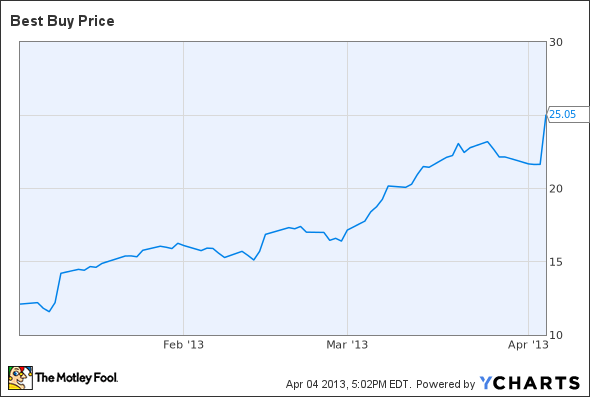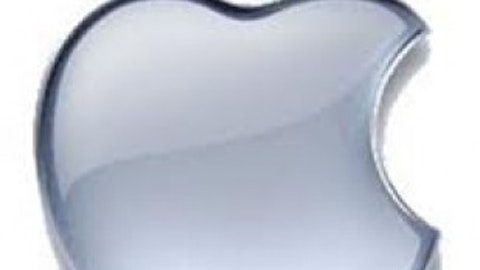On Thursday, Best Buy Co., Inc. (NYSE:BBY) stock climbed 16% following news that Samsung would open “Samsung Experience Shops” in more than 1,400 Best Buy Co., Inc. (NYSE:BBY) stores over the next few months. The first 500 shops will begin opening as early as April 8, according to Bloomberg. This first batch of Samsung Experience Shops will take up approximately 460 square feet of prime space near the front of the Best Buy Co., Inc. (NYSE:BBY) stores, and will feature “Samsung Experience Consultants.” These personnel will be hired and trained by Samsung to assist customers who are interested in Samsung devices. A Samsung Experience Shop prototype. Source: Samsung.
A Samsung Experience Shop prototype. Source: Samsung.
This move appears to be a clear win-win for Samsung and Best Buy Co., Inc. (NYSE:BBY). That said, Best Buy Co., Inc. (NYSE:BBY) stock has really run ahead of the company’s fundamentals. While domestic comparable-store sales increased last quarter — for the first time in more than a year — EPS was still down by 25% year over year. Nevertheless, the stock has more than doubled in the last three months.
Best Buy 3-month stock chart, data by YCharts.
Best Buy CEO Hubert Joly still has his work cut out for him in his effort to turn the struggling electronics giant around. While Best Buy’s price-matching strategy has made the company more competitive with Amazon.com, Inc. (NASDAQ:AMZN) , Amazon.com, Inc. (NASDAQ:AMZN) is likely to continue chipping away at Best Buy’s electronics market share over time, while pressuring its gross margin. Accordingly, I would view the recent run-up as a good opportunity for shareholders to take profits on Best Buy stock.
Benefits of the partnership
Samsung has made great progress in catching up to Apple Inc. (NASDAQ:AAPL) in the mobile device market over the past few years, but the company has had trouble breaking Apple Inc. (NASDAQ:AAPL)‘s stranglehold on the U.S. market. One of the main barriers for Samsung has been Apple Inc. (NASDAQ:AAPL)‘s strong retail presence in the U.S., where it operates roughly 250 Apple Stores. The knowledgeable staff and strong customer-service orientation of Apple retail stores draws in new customers, and the large U.S. store footprint is a major reason Apple is so dominant here. In fact, the iPhone surpassed 50% market share in the U.S. last fall.
While the Samsung Experience Shops obviously will not be able to provide the same kind of experience as the Apple Store in 460 square feet, they will still vastly improve Samsung’s U.S. retail presence. Samsung will benefit from Best Buy’s strong traffic, but conversely, the Samsung shops may bring new traffic into the stores. Moreover, this partnership highlights the promise of Best Buy’s strategy of reallocating square footage from declining categories like CDs and DVDs toward growth areas like mobile devices.
But Best Buy stock seems pricey
As I wrote last month, analysts predicting Best Buy’s demise have gotten ahead of themselves. The introduction of price-matching in the U.S. had a clear positive impact on the company’s results last quarter, and Best Buy’s decision to continue matching competitors’ prices year-round should help it compete more effectively with Amazon in the future. Nevertheless, I do not think the company’s fundamentals support the Best Buy stock price of $25.13 (as of Thursday’s close).
Analysts expect Best Buy to post another double-digit decline in EPS this year, to $2.16. After Thursday’s rally, Best Buy stock trades at nearly 12 times expected earnings, which is quite expensive for a company with stagnant-to-falling sales and earnings. If Best Buy’s turnaround hits any bumps in the next year, the stock could easily drop back below $20. Shareholders might therefore want to take advantage of the recent rally to take profits or cut their losses.
The article Best Buy Stock Soars on Samsung Experience Shop Deal originally appeared on Fool.com is written by Adam Levine-Weinberg.
Fool contributor Adam Levine-Weinberg owns shares of Apple and is short shares of Amazon.com. The Motley Fool recommends Amazon.com and Apple. The Motley Fool owns shares of Amazon.com and Apple.
Copyright © 1995 – 2013 The Motley Fool, LLC. All rights reserved. The Motley Fool has a disclosure policy.




